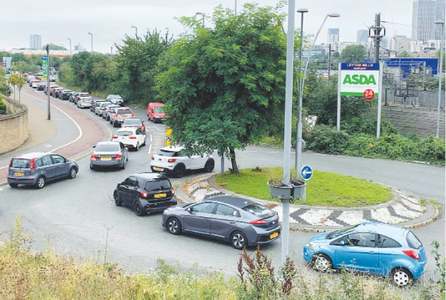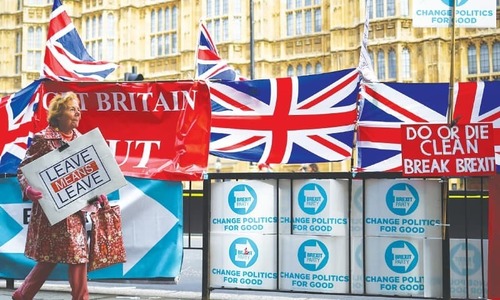Fuel pumps ran dry in parts of Britain on Monday as panic-buying drained tanks at filling stations, while the government tries to tackle a shortage of lorry drivers with a dramatic post-Brexit immigration policy U-turn.
A queue 50 cars-long was seen at one petrol station in east London, with some drivers having waited since before dawn to fill up their vehicles, an AFP photographer said.
Other stations across the British capital and southeast England simply posted signs stating that “no fuel” was available and apologised for pumps being out of use.
The Petrol Retailers Association claimed that almost half of the UK's 8,000 fuel pumps had run out of petrol on Sunday, as desperate drivers — including key workers — formed long queues to fill up.
London's Mayor Sadiq Khan said public transport and emergency services had stocks in reserve but hospital and care workers, as well as taxi drivers, were struggling to find fuel to go to work.
The government maintains it has enough fuel in stock but not enough lorry drivers to deliver it, with critics blaming an exodus of truckers from Europe after Brexit.
Ministers, though, insist the situation mirrors driver shortages across the EU, which have been exacerbated by the coronavirus pandemic, leaving some supermarket shelves empty and raising fears about deliveries for Christmas.
PRA chairman Brian Madderson told the BBC that shortages were down to “panic buying, pure and simple”, as the government triggered emergency measures.
Business Secretary Kwasi Kwarteng said he had suspended oil industry competition laws to ensure suppliers “can share vital information and work together more effectively to ensure disruption is minimised”.
Army help?
Prime Minister Boris Johnson is considering whether to call upon soldiers to deliver fuel to petrol stations across the country, according to newspaper reports.
Environment Secretary George Eustice confirmed that the government is using Ministry of Defence personnel to help train new lorry drivers.
But he insisted there were “no plans at the moment” to draft in troops to drive petrol tankers, and is instead banking on a new short-term visa waiver scheme to entice foreign truckers.
“The most important thing is that people buy petrol as they normally would,” he told reporters. “The only reason we don't have petrol ... is that people are buying petrol they don't need.”

Johnson's spokesman said the government, though, did not rule calling up troops. “As a responsible government, we are taking the preparatory steps necessary should further measures be needed,” he told reporters.
Britain's lorry drivers shortage is affecting many sectors including the food industry, although German supermarket Aldi on Monday insisted it was coping well regarding deliveries to its many UK stores.
On Saturday, the government — which campaigned for an end to European free movement — said it will issue up to 10,500 temporary work visas to lorry drivers and poultry workers to ease chronic staff shortages.
The short-term visas are to run from October until late December.
Driver shortage
The situation has evoked the dark days of the 1970s, when energy supply problems led to a three-day working week and fuel rationing in Britain.
It is reminiscent also of late 2000, when people protesting over high fuel prices blockaded oil refineries, bringing the country to a virtual standstill for weeks.
Britain's government insists it is not alone in suffering from a shortage of lorry drivers — pointing to a lack of heavy goods vehicles (HGV) also in Poland and Germany — a situation it blames on workers taking up different jobs during Covid.
The UK has an estimated shortage of about 100,000 HGV drivers amid warnings from various sectors that supplies will continue to run short.
Oil giant Shell on Monday said it was “working hard to ensure supplies for customers”.
It added: “Since Friday we have been seeing a higher than normal demand across our network which is resulting in some sites running low on some (petrol) grades.
“We are replenishing these quickly, usually within 24 hours. “














































